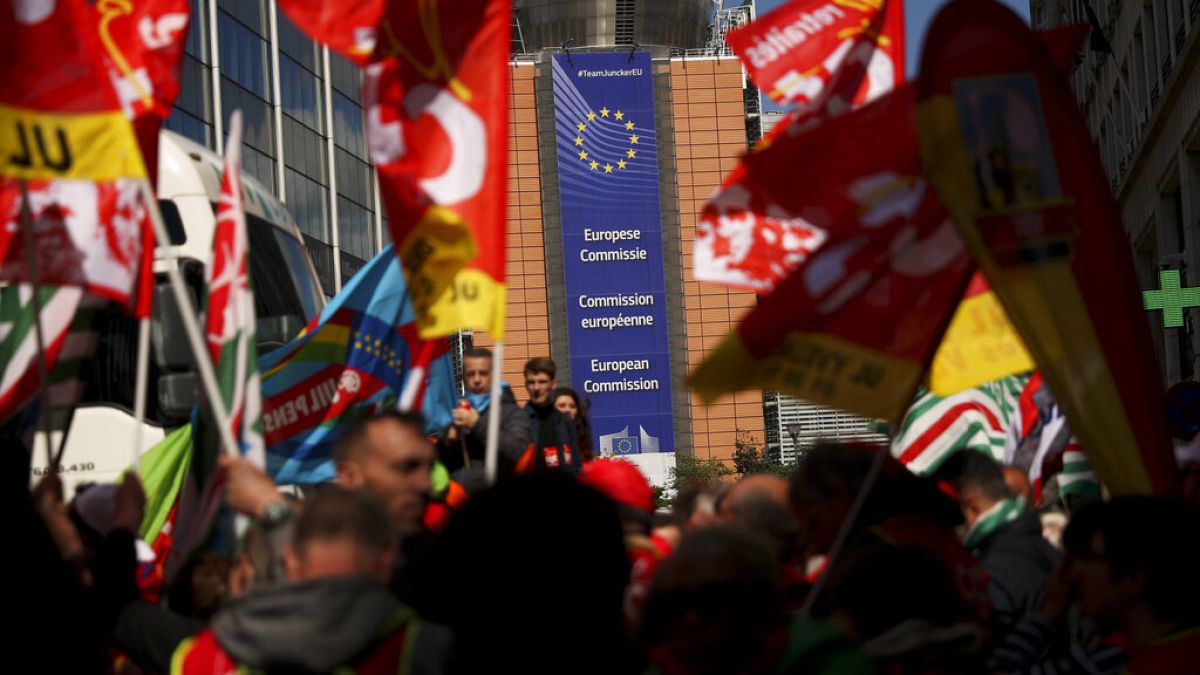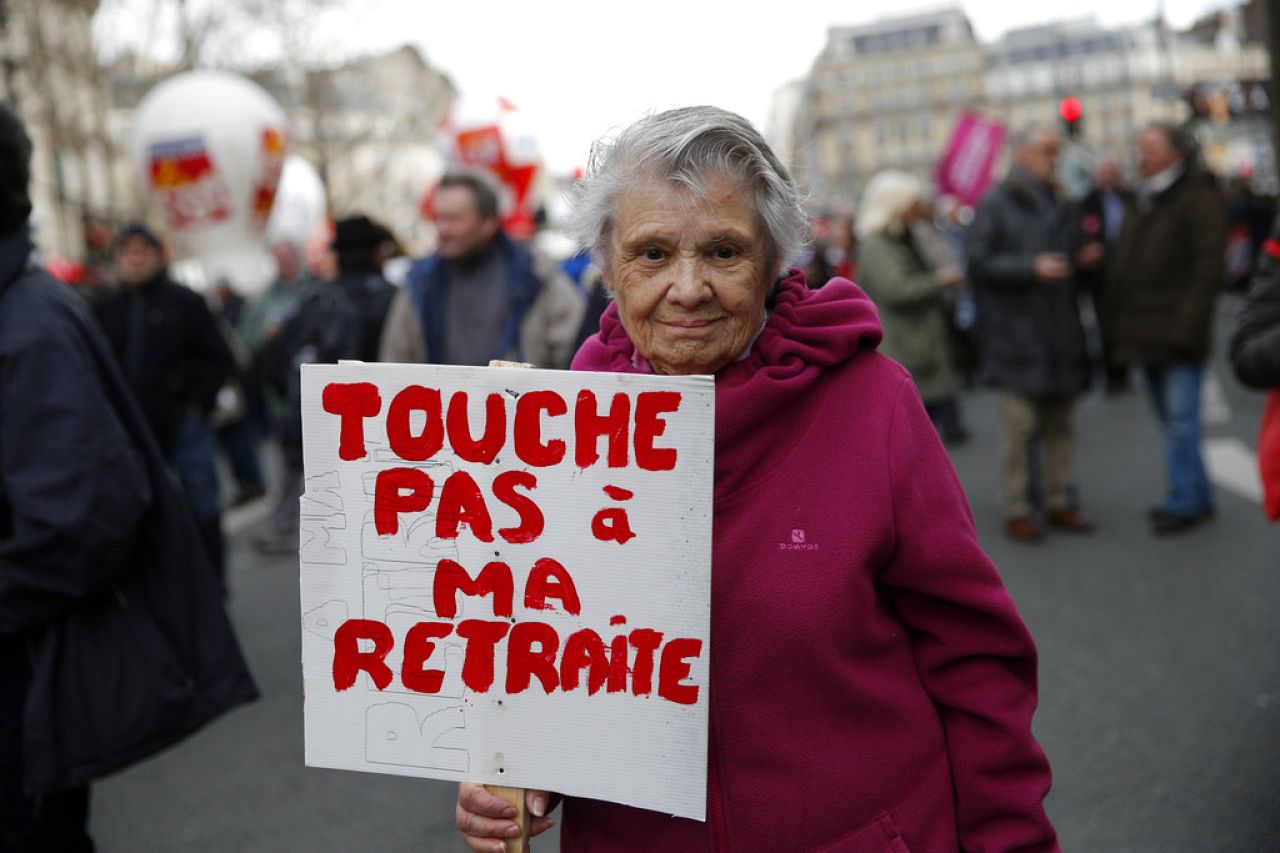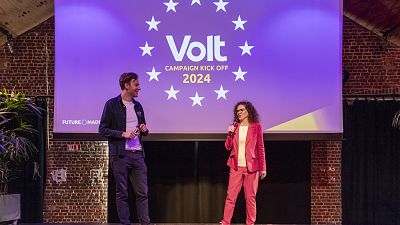High prices and social inequalities are the main issues in the minds of voters, according to Euronews' exclusive poll.
The fight against rising prices and social inequalities are the most important issues for European voters ahead of the European Parliament elections in June, according to an exclusive poll by Ipsos for Euronews.
Beating out topics like climate change and immigration, economic issues represent four out of the top five topics that Europeans think should be the highest priorities for incoming decision-makers.
The first-of-its-kind survey, conducted in 18 countries representing 96% of the EU's population, found that rising prices remain the leading electoral issue for Europeans, followed closely by social concerns such as preserving healthcare and pension systems.
“High inflation in the past two years has made everyone worse off, and it came on top of a pandemic economic contraction and follows decades of slow economic growth in Europe,” said Fredrik Erixon, director at the European Centre for International Political Economy.
“If we continue to live in a low-growth region, we won't have the resources to effect a rapid green transformation and improve our geopolitical protection, so voters are dead right to place the fight against inflation and economic stagnation at the top of the agenda.”
Responding to the results of the poll, which is the first of its kind pan-European survey, European Commissioner for Jobs and Social Rights Nicolas Schmit said that ensuring adequate wages afford a decent living is “one clear way” to meet the rising costs in Europe.
“We have set the wheels in motion in the minimum wages directive. Looking ahead, all policy-makers must redouble their efforts to combat poverty and social exclusion. This means assessing the distributional impact of all policies and protecting those most at risk,” said Schmit, who is also the lead candidate to face off against Ursula von der Leyen to be European Commission president in June on behalf of the Party of European Socialists.
With inflation slowing, prices are still a top priority
While the EU's economic output has been struggling to grow, inflation in the bloc has subdued somewhat, from 9.9% to 2.8% in the 12 months to February 2024.
However, people are yet to feel any relief from the slowing rate of price rises in their daily lives: just last September, a separate poll from Ipsos revealed that almost one-third of Europeans find themselves in a "precarious" financial situation.
In Euronews' new poll, the fight against rising prices came in as voters' biggest issue, with 68% of respondents calling it a priority and 25% more thinking that it is important, even if not their highest priority.
When divided by age, more 50-64-year-olds saw tackling rising prices as a priority than any other group (71%). By occupation, the rate was highest among manual workers (73%).
When voting intention was accounted for, the highest rate of those prioritising rising prices (79%) came out among those intending to back the far-right political group Identity and Democracy Party.
Looking at it on a country-by-country basis, people in Portugal and Greece were on top of the list, with more than 80% of voters seeing tackling high prices as a priority.
“The fact that the rising cost of living is a top concern for voters is extremely concerning and should ring alarm bells for EU leaders that people are not receiving the support they need”, said Laura de Bonfils, secretary general at Social Platform, the umbrella organisation for NGOs working on social issues in Europe. She added that millions of Europeans face precarious living conditions.
European Parliament groups interviewed by Euronews Business offered different explanations for why economic concerns are top of mind for European voters. Some attributed it to global crises such as Russia's full-scale invasion of Ukraine, while others pointed fingers at their colleagues.
“The cost of living crisis, triggered by Putin's illegal invasion of Ukraine and the pandemic, has affected all of us,” said Clara de Melo Ponce, spokesperson for the liberal and centrist Renew Europe group.
“European action, led by European liberals and democrats, was successful in reducing the price of gas and electricity [and] tackling high prices will be addressed by building a more resilient and competitive economy,” she added.
The group uniting left-wing parties in the European Parliament challenged the narrative that the EU's centrist policies have eased economic struggles.
“Following the pandemic, the EU has allowed rampant price gouging and profiteering from suppliers of key services such as food and energy leading to rapid inflation and hurting farmers and consumers alike,” said a spokesperson for the Left in the European Parliament.
Almost 100 million people in the EU ‘are at risk of poverty and social exclusion’
The reduction of social inequalities and the preservation of social protection systems (such as health and pensions), is almost as important for voters as tackling high prices, according to Euronews’ poll.
Some 64% of all respondents called it a priority, while in a country-by-country comparison, the highest rates of voters seeing it as such were in Portugal, Spain and Romania.
“The insecurity and instability of recent years combined with a significant lack of investment in social services and social protection systems has left approximately 95.3 million in the EU at risk of poverty and social exclusion – with one in five being children,” said de Bonfils from Social Platform.
The organisation called on EU leaders “to reaffirm their commitment to the Social Pillar and its Action Plan”, which outlines 20 priorities for the bloc to tackle, including fair working conditions and the right to decent wages and health care, alongside a target to reduce the number of people at risk of poverty or social exclusion by at least 15 million by 2030.
The European Federation of Public Service Unions (EPSU) also highlighted the importance of the action plan, with General Secretary Jan Willem Goudriaan saying that parties' priority should be addressing the cost of living, improving the quality of public services and reducing inequalities - not more austerity.
Left-wing parties couldn't agree more, with a spokesperson emphasising the need for investment in quality public services. However, they expressed concern over the new Economic Governance Framework reform, fearing it will compel countries to further reduce national budgets despite the existing strain on public services.
In a similar vein, the European Greens advocate for legislation to classify platform workers as employees, ensuring they receive minimum wages, collective bargaining rights, and legal employment protections. Additionally, they're pushing for an EU anti-poverty strategy to eradicate homelessness by 2030, halve child poverty by 2030, and eliminate it entirely by 2040.
Unemployment and economic growth
Supporting economic growth is the third most important issue for voters, according to Euronews' poll, with 62% of respondents calling it a priority.
Portugal, Romania and Greece were the countries with the highest number of people labelling it this way.
By age, the most concerned are those older than 50, while European manual workers and people intending to vote for the centre-right European People's Party Group (EPP), which is the largest political group in the European Parliament, had the highest rates of people calling economic growth a priority.
EPP didn't immediately respond to Euronews Business' request for comment.
The European economy saw a slight increase in GDP at the end of 2023, but the eurozone countries just narrowly avoided recession, with the bloc's biggest economies, Germany and France dragging down the figures.
Against the backdrop of a stable 6% unemployment rate in the EU, the fight against unemployment ended up in fifth place on the priority list.
Some 57% of Europeans see it as a priority, with another 34% calling it important but not a priority.
The highest rates of people naming it a priority came from Portugal (80%), followed closely by Spain, Greece and Italy. By age group, those between 55 and 64 years came out on top, and by occupation, manual workers took the lead.
What should be on the political agenda for the next years?
Experts and politicians differ over what the EU's priorities should be over the next few years to get the economy under control, as the European Commission and MEPs begin their new mandates.
“I think the task for the next five years is obvious: make it a key priority again to raise competitiveness and growth,” said Erixon. “Too many political leaders in the past five years took a holiday from economic realities and thought they could just spend, spend and spend without first generating necessary economic resources.”
“We now need to get back to the core EU agenda of cutting barriers to the single market and taking away much of the regulatory bureaucracy that is holding Europe's economy back,” he added.
The European Commission recently cut back its growth forecast to 0.9% for the EU for this year, expecting the economy to stabilise further in the latter half of 2024.
Nevertheless, political groups across the hemicycle are split on how to improve economic conditions, tackle high prices and address social inequalities
For Renew Europe, the EU needs to “increase the EU's global competitiveness and unleash the potential of our small businesses, [...]cut red tape, reduce our energy dependencies, create more access to other markets, make trade fairer and mobilise private investment for innovation”.
For the Left, besides increasing investment in public services, the solution to current problems lies in amending tax regimes. “In the medium- to long-term, high prices can be addressed with decent work and wages combined with a tax on excess profits and a more progressive approach to taxation more generally, with a focus on wealth rather than income,” the group's spokesperson told Euronews Business.
The Greens also intend to tackle inequalities in its economic agenda partially by taxation, claiming their tax proposals “will reduce the tax burden on workers and support access to energy, food, and housing for the poorest by increasing taxes on polluters and the ultra-rich”. They also said that “universal basic income should be researched and studied”.
As for Social Platform, a European directive on adequate minimum income is the “key step to tackle social inequalities”, highlighting that not a single EU member state has “a minimum income scheme which is set above the poverty line”.
Tackling income has the potential to boost household consumption, a segment that provides at least half of the EU's GDP.
Regardless of the course of action chosen, the EU's incoming policymakers have their work cut out for them: according to Euronews' poll, only 28% of respondents perceive the EU as having a positive impact on economic growth in the past few years, compared to 36% expressing negative sentiments.
It will be up to the new commission, as well as the new intake of MEPs, to reverse this trend.




